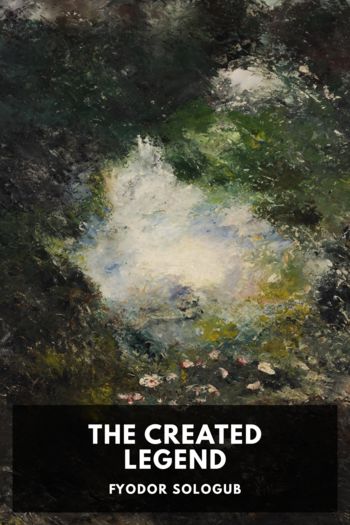Short Fiction - Gustave Flaubert (best free e reader .TXT) 📗

- Author: Gustave Flaubert
Book online «Short Fiction - Gustave Flaubert (best free e reader .TXT) 📗». Author Gustave Flaubert
Suddenly violent blows resounded upon the castle gates. The news of the imprisonment of Iaokanann had spread rapidly, and now it appeared that the whole surrounding population was flocking to the castle. Men with torches were hastening along the roads in all directions; a black mass of people swarmed in the ravine; and from all throats came the cry: “Iaokanann! Iaokanann!”
“That man will ruin everything,” said Jonathas.
“We shall have no more money if this continues,” said the Pharisees.
Accusations, recriminations, and pleadings were heard on all sides.
“Protect us!”
“Compel them to cease!”
“Thou didst abandon thy religion!”
“Impious as all the Herods!”
“Less impious than thou!” Antipas retorted. “Was it not my father that erected thy Temple?”
Then the Pharisees, children of the proscribed tribes, partisans of Mattathias, accused the tetrarch of all the crimes committed by his family.
The Pharisees had pointed skulls, bristling beards, feeble hands, snub noses, great round eyes, and their countenances bore a resemblance to that of a bulldog. A dozen of these people, scribes and attendants upon the priests, who picked up their living from the refuse of holocausts, rushed to the foot of the pavilion and threatened Antipas with their knives. He attempted to speak to them, being only slightly protected by some of the Sadducees. Suddenly he perceived Mannaeus at a distance and made him a sign to approach. The expression on the face of Vitellius indicated that he regarded all this turmoil as no concern of his.
The Pharisees, leaning against the pavilion, were now beside themselves with demoniac fury. They broke plates and dashed them upon the floor. The attendants had served them with a ragout composed of the flesh of the wild ass, an unclean animal, and their anger knew no bounds. Aulus rallied them jeeringly apropos of the ass’s head, which he declared they honoured. He flung other sarcasms at them, regarding their antipathy to the flesh of swine, intimating that no doubt their hatred arose from the fact that that beast had killed their beloved Bacchus, and saying it was to be feared they were too fond of wine, since a golden vine had been discovered in the Temple.
The priests did not understand his sneers, and Phineas, of Galilean origin, refused to translate them. Aulus suddenly became angry, the more so because the little Asiatic, frightened at the tumult, had disappeared. The feast no longer pleased the noble glutton; the dishes were vulgar, and not sufficiently disguised with delicate flavourings. After a time his displeasure abated, as he caught sight of a dish of Syrian lambs’ tails, dressed with spices, a favourite dainty.
To Vitellius the character of the Jews seemed frightful. Their God was like Moloch, several altars to whom he had passed upon his route; and he recalled the stories he had heard of the mysterious Jew who fattened small children and offered them as a sacrifice. His Latin nature was filled with disgust at their intolerance, their iconoclastic rage, their brutal, stumbling bearing. The proconsul wished to depart, but Aulus refused to accompany him.
The exaltation of the people increased. They abandoned themselves to dreams of independence. They recalled the glory of Israel, and a Syrian spoke of all the great conquerors they had vanquished—Antigone, Crassus, Varus.
“Miserable creatures!” cried the enraged proconsul, who had overheard the Syrian’s words.
In the midst of the uproar Antipas remembered the medallion of the emperor that Herodias had given to him; he drew it forth and looked at it a moment, trembling, then held it up with its face turned towards the throng.
At the same moment, the panels of the gold-railed balcony were folded back, and, accompanied by slaves bearing wax tapers, Herodias appeared, her coiffure crowned with an Assyrian mitre, which was held in place by a band passing under the chin. Her dark hair fell in ringlets over a scarlet peplum with slashed sleeves. On either side of the door through which one stepped into the gallery, stood a huge stone monster, like those of Atrides; and as Herodias appeared between them, she looked like Cybele supported by her lions. In her hands she carried a patera, a shallow vessel of silver used by the Romans in pouring libations; and, advancing to the front of the balcony and pausing just above the tetrarch’s chair, she cried:
“Long live Caesar!”
This homage was repeated by Vitellius, Antipas, and the priests.
But now, beginning at the farthest end of the banqueting-hall, a murmur of surprise and admiration swept through the multitude. A beautiful young girl had just entered the apartment, and stood motionless for an instant, while all eyes were turned upon her.
Through a drapery of filmy blue gauze that veiled her head and throat, her arched eyebrows, tiny ears, and ivory-white skin could be distinguished. A scarf of shot-silk fell from her shoulders, and was caught up at the waist by a girdle of fretted silver. Her full trousers, of black silk, were embroidered in a pattern of silver mandragoras, and as she moved forward with indolent grace, her little feet were seen to be shod with slippers made of the feathers of hummingbirds.
When she arrived in front of the pavilion she removed her veil. Behold! she seemed to be Herodias herself, as she had appeared in the days of her blooming youth.
Immediately the damsel began to dance before the tetrarch. Her slender feet took dainty steps to the rhythm of a flute and a pair of Indian bells. Her round white arms seemed ever beckoning and striving to entice to her side some youth who was fleeing from her allurements. She appeared to pursue him, with movements light as a butterfly; her whole mien was like that of an inquisitive Psyche, or a





Comments (0)